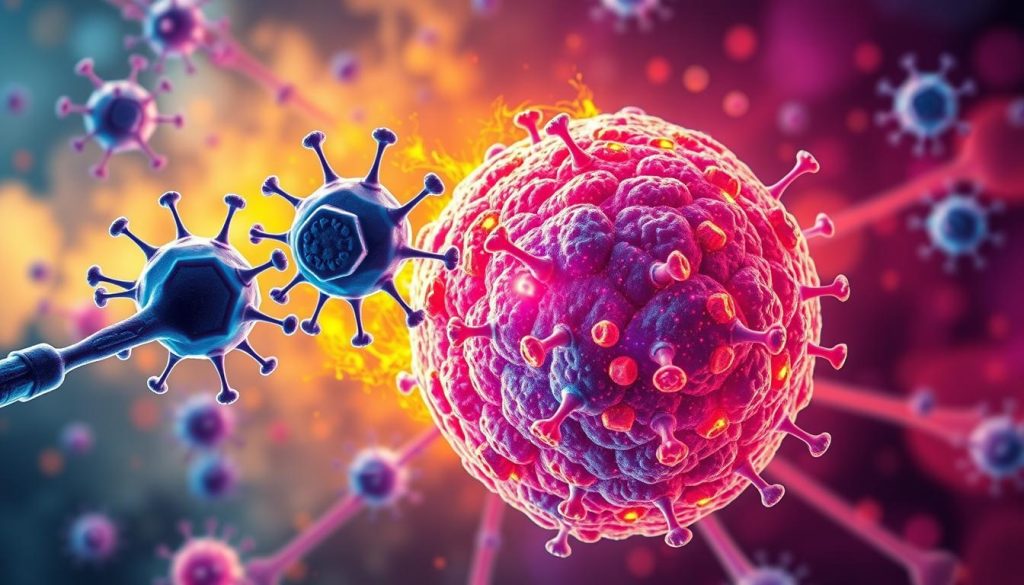Cancer immunotherapy has changed how we treat many cancers. CAR T cell therapy is a key part of this change. It uses a patient’s immune cells to fight cancer, showing promise for treating solid tumors.
While CAR T cell therapy works well for some cancers, it’s harder to use in solid tumors. This is because solid tumors have a complex environment and are made up of different types of cells. But, new research in cancer immunology and CAR T cell engineering is helping to solve these problems.
This article looks at the latest in CAR T cell therapy for solid tumors. We explore the challenges, new ideas, and clinical trials that are changing cancer treatment. We discuss everything from dual-targeted CAR T cells to combining therapies and personalized medicine. These advancements offer hope for those fighting solid tumors.
Introduction to CAR T Cell Therapy
Cancer treatment has seen big improvements, thanks to new therapies like chimeric antigen receptor (CAR) T cell therapy. This therapy uses a patient’s immune system to fight cancer. It’s a big step forward in targeted cancer therapy.
This treatment changes a patient’s T cells to fight cancer. T cells are a type of white blood cell. They are made to find and attack cancer cells.
What is CAR T Cell Therapy?
CAR T cell therapy is a new way to fight cancer. It uses the body’s immune system to target cancer cells. Here’s how it works:
- T cells are taken from the patient’s blood.
- These T cells are changed to find and attack cancer cells.
- The T cells are grown in a lab to make more.
- The patient gets chemotherapy to make room for the T cells.
- The T cells are given back to the patient.
How CAR T Cells Work
After being given back to the patient, CAR T cells look for cancer cells. They bind to these cells and kill them. This is because they have been changed to find and attack cancer.
These T cells also grow and remember cancer cells. This means they can keep fighting cancer for a long time.
“CAR T cell therapy represents a paradigm shift in cancer treatment, moving us closer to truly personalized medicine.” – Dr. Crystal Mackall, Stanford University School of Medicine
CAR T cell therapy works best for blood cancers like leukemia and lymphoma. It has shown great results in patients who have tried other treatments.
| Disease | CAR Target | Response Rate |
|---|---|---|
| ALL | CD19 | 80-90% |
| DLBCL | CD19 | 50-60% |
| Multiple Myeloma | BCMA | 80-90% |
Challenges of Treating Solid Tumors with CAR T Cells
CAR T cell therapy has shown great success in fighting blood cancers. But, it faces big challenges when used against solid tumors. The complex nature of solid tumors makes it hard to use CAR T cells effectively.
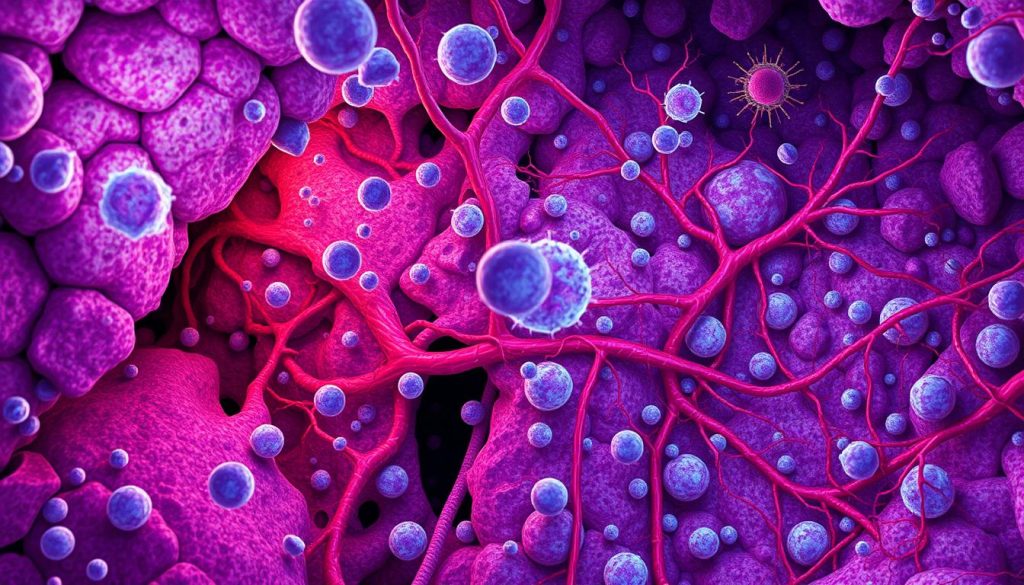
Tumor Heterogeneity and Antigen Escape
One big problem is that solid tumors have different cells with varying antigens. This makes it hard for CAR T cells to find and kill all tumor cells. As a result, some tumor cells can avoid being killed, leading to relapse.
Immunosuppressive Tumor Microenvironment
The environment around solid tumors also hinders CAR T cells. This environment is designed to suppress immune cells, including CAR T cells. It’s filled with cells and substances that stop immune cells from working well.
The table below shows some key players in this suppressive environment:
| Immunosuppressive Component | Mechanism of Action |
|---|---|
| Regulatory T cells (Tregs) | Suppress effector T cell function |
| Myeloid-derived suppressor cells (MDSCs) | Inhibit T cell activation and proliferation |
| TGF-β | Inhibits T cell differentiation and effector function |
| IL-10 | Promotes immunosuppressive regulatory cell phenotypes |
Limited T Cell Trafficking and Infiltration
Another challenge is getting CAR T cells to reach the tumor. Solid tumors don’t have the right signals for T cells to find and enter the tumor. Physical barriers also make it hard for T cells to get inside.
A leading researcher once said:
The solid tumor microenvironment represents a formidable fortress that must be breached for CAR T cells to unleash their full therapeutic potential.
To overcome these challenges, new strategies are needed. These will be discussed in the next parts of this article.
Strategies to Enhance CAR T Cell Efficacy in Solid Tumors
Researchers are working hard to make CAR T cell therapy better for solid tumors. They aim to improve how well CAR T cells work in the tough environment of tumors.
One idea is to target more than one antigen at a time. This helps deal with the problem of tumors changing their targets. They’re making CAR T cells that can hit multiple targets.
Another strategy is to make CAR T cells stronger against the tumor’s defenses. They’re adding special parts to CAR T cells to help them grow and fight longer. Also, using CAR T cells with other treatments can help them work better.
Getting CAR T cells into solid tumors is key. Scientists are trying to make CAR T cells better at finding their way to tumors. They’re also looking at ways to change the tumor’s structure to help CAR T cells get in.
These new ideas and ongoing studies are hopeful for CAR T cell therapy in solid tumors.
Targeting Multiple Antigens with CAR T Cells
Using CAR T cell therapy for solid tumors faces a big challenge. Tumors can change and hide from the immune system. Researchers are working on ways to attack more than one target at a time. This could make CAR T cell therapy more effective and precise.
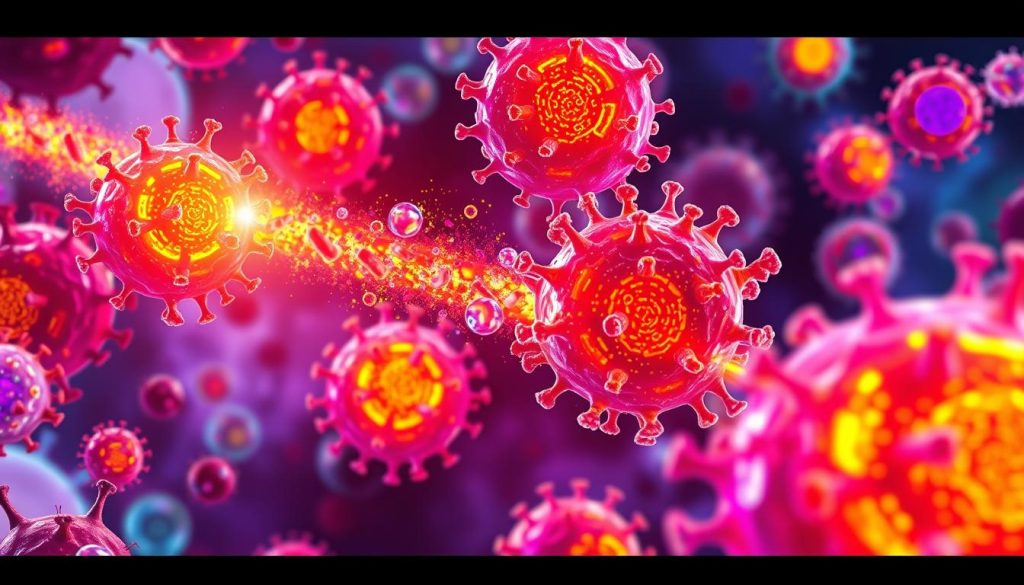
Scientists are coming up with new ways to make CAR T cells hit multiple targets:
Dual-Targeted CAR T Cells
Dual-targeted CAR T cells have two CARs, each for a different tumor antigen. This way, they can take down more tumor cells and lower the chance of the tumor hiding. Early tests show they work well in solid tumors.
Tandem CAR T Cells
Tandem CAR T cells have one CAR with two parts that can grab two different antigens. This makes them more specific and powerful. Tests show they work better than single-target CARs.
Universal CAR T Cells
Universal CAR T cells can attack many antigens with the help of special molecules. This lets them target a wide range of tumors without needing many CARs. They offer a flexible way to fight cancer.
| CAR T Cell Approach | Mechanism | Advantages |
|---|---|---|
| Dual-Targeted CAR T Cells | Express two distinct CARs | Broader tumor cell elimination, reduced antigen escape |
| Tandem CAR T Cells | Single CAR with two antigen-binding domains | Enhanced specificity and potency |
| Universal CAR T Cells | Use adaptor molecules to target multiple antigens | Flexibility and adaptability in targeted therapy |
These advanced CAR T cell methods are very promising. They aim to tackle the big challenges of solid tumors. As research keeps going, we’ll see even more ways to make CAR T cell therapy better for fighting solid tumors.
Engineering CAR T Cells to Overcome Immunosuppression
CAR T cell therapy has been a big success in fighting blood cancers. But, it hasn’t worked as well for solid tumors because of the tumor’s immune-blocking environment. Scientists are working on new ways to make CAR T cells better at fighting solid tumors.
One new idea is to make “armored” CAR T cells. These cells are designed to fight back against the tumor’s immune-suppressing signals. They might carry cytokines like IL-12 or IL-15 to help T cells grow and survive. Or, they could have special receptors that block signals that stop T cells from working.
Armored CAR T Cells
Studies have shown that armored CAR T cells can be more effective against solid tumors. For instance, CAR T cells that make IL-12 can kill cancer cells better and stay active longer in ovarian cancer. Also, CAR T cells with a special TGF-β receptor can resist the tumor’s immune-suppressing effects in glioblastoma.
CAR T Cells with Checkpoint Inhibitors
Another way to boost CAR T cells is to pair them with checkpoint inhibitors. These inhibitors, like anti-PD-1 or anti-CTLA-4 antibodies, help T cells work better. Early tests suggest that combining CAR T cells with these inhibitors can make them more effective against melanoma and lung cancer.
The table below shows some key ways to make CAR T cells better at fighting tumors:
| Strategy | Mechanism | Examples |
|---|---|---|
| Armored CAR T cells | Express additional molecules to counteract immunosuppression | IL-12, IL-15, dominant-negative TGF-β receptor |
| Combination with checkpoint inhibitors | Release brakes on T cell activation | Anti-PD-1, anti-CTLA-4 |
Creating CAR T cells that can fight through the tumor’s defenses is a promising area of research. It could lead to better treatments for solid tumors. More studies are needed to make these ideas work in real-world treatments.
Improving T Cell Trafficking and Infiltration
Using CAR T cell therapy for solid tumors faces a big challenge. T cells struggle to get into and move through the solid tumor microenvironment. The dense, fibrotic stroma and abnormal blood vessels in solid tumors block T cells, including CAR T cells. Researchers are working on new ways to help T cells get into solid tumors better.
Scientists are making CAR T cells with special receptors. These receptors match the signals from tumor cells. This lets CAR T cells find and enter solid tumors more easily.
“Chemokine receptor-engineered CAR T cells have shown promising results in preclinical models, demonstrating enhanced migration and infiltration into solid tumors.”
This method aims to get past the barriers in the tumor environment. It brings the therapeutic cells right to where they’re needed.
CAR T Cells with Chemokine Receptors
Another exciting area is combining CAR T cells with other treatments. For example, using drugs to break down the tumor’s outer layer or fix its blood vessels before CAR T cell treatment. This makes it easier for T cells to get in. Adding checkpoint inhibitors or other drugs can also help T cells work better in the tumor.
Combination Therapies to Enhance T Cell Infiltration
As we learn more about CAR T cells and solid tumors, we’re finding new ways to improve T cell entry. By engineering CAR T cells and using combination therapies, we’re getting closer to making this treatment work better for solid tumor patients.
Preclinical Studies of CAR T Cell Therapy in Solid Tumors
Preclinical studies have been key in advancing CAR T cell therapy for solid tumors. They offer insights into its effectiveness and limitations. This knowledge helps move the therapy from the lab to patients.
Many studies have looked at CAR T cell therapy in solid tumors. These include:
- Breast cancer
- Lung cancer
- Ovarian cancer
- Pancreatic cancer
- Glioblastoma
These studies show CAR T cells can target and kill tumor cells. For example, a study by Guo et al. found HER2-specific CAR T cells worked well in ovarian cancer mice.
But, there are challenges. These include:
- T cells struggle to reach the tumor
- The tumor environment can block T cells
- Tumors can change and avoid being targeted
The tumor microenvironment presents a formidable barrier to the efficacy of adoptive T cell therapies for solid tumors.
To overcome these issues, researchers have tried different approaches. These include:
| Strategy | Mechanism | Example |
|---|---|---|
| Dual-targeted CARs | Targeting multiple tumor-associated antigens | HER2-MUC1 CAR T cells |
| Armored CARs | Secretion of immunomodulatory factors | IL-12 secreting CAR T cells |
| Combination therapies | Enhancing T cell infiltration and activity | CAR T cells + checkpoint inhibitors |
These successes in the lab are the start of CAR T cell therapy in solid tumors. They give hope to those with hard-to-treat cancers. As research improves CAR T cell technology, we can expect better treatments for solid tumors.
Clinical Trials of CAR T Cell Therapy in Solid Tumors
The field of car t cell therapy in solid tumors has seen big progress. Many clinical trials are underway to check its safety and how well it works. These studies are giving us insights into using this new immunotherapy for different solid tumors.

Completed Clinical Trials
Some finished clinical trials have shown good results for CAR T cell therapy in solid tumors. For instance, a phase I trial for mesothelin in mesothelioma and pancreatic cancer patients showed some tumors shrinking or staying the same. Another trial for GD2 in neuroblastoma patients found complete and partial responses, showing its promise.
But, these trials also found some challenges. Issues like on-target, off-tumor toxicity and T cells not lasting long were seen. Researchers are working hard to find ways to fix these problems and make CAR T cells more effective in solid tumors.
Ongoing Clinical Trials
Many ongoing clinical trials are looking into CAR T cell therapy for various solid tumors. These include:
- Glioblastoma
- Breast cancer
- Ovarian cancer
- Prostate cancer
- Lung cancer
These trials are trying different targets, CAR designs, and ways to combine them. They’re also exploring new ideas, like universal CAR T cells and armored CAR T cells, to tackle the tough tumor environment.
| Clinical Trial Phase | Number of Trials |
|---|---|
| Phase I | 42 |
| Phase I/II | 31 |
| Phase II | 12 |
The ongoing clinical trials of CAR T cell therapy in solid tumors hold great promise for the future of cancer treatment. As we continue to learn from these studies, we move closer to unlocking the full potential of this groundbreaking immunotherapy approach.
As we move forward, the results from these trials will be key to improving CAR T cell therapy for solid tumors. This will help us get closer to more effective and personalized cancer treatments.
car t cell therapy in solid tumors
Car T cell therapy is a targeted cancer therapy and adoptive cell transfer that has worked well for some blood cancers. But, it’s harder to use it for solid tumors. Researchers are working hard to make CAR T cells better for solid tumors.
Current Status
Studies have shown CAR T cells can target solid tumor antigens like HER2 and EGFR. These studies look promising in animal tests, where CAR T cells kill tumor cells well. But, making this work in people is harder.
So far, CAR T cell therapy in solid tumors has had mixed results in people. Some patients see their tumors shrink and live longer. But, others don’t get better. The solid tumor environment is very hard to fight.
Future Directions
Researchers are looking at new ways to make CAR T cells better for solid tumors. They’re thinking about:
- Targeting more than one tumor antigen to fight tumor changes
- Designing CAR T cells to fight off the tumor’s defenses
- Helping CAR T cells get into solid tumors better by using special receptors or other treatments
As we learn more about CAR T cells and solid tumors, we’ll see better treatments. Using CAR T cells with other treatments might help patients even more.
Safety Considerations for CAR T Cell Therapy in Solid Tumors
As CAR T cell therapy advances in solid tumors, safety is key. This treatment has worked well in blood cancers but faces new challenges in solid tumors. It’s important to manage these risks carefully.
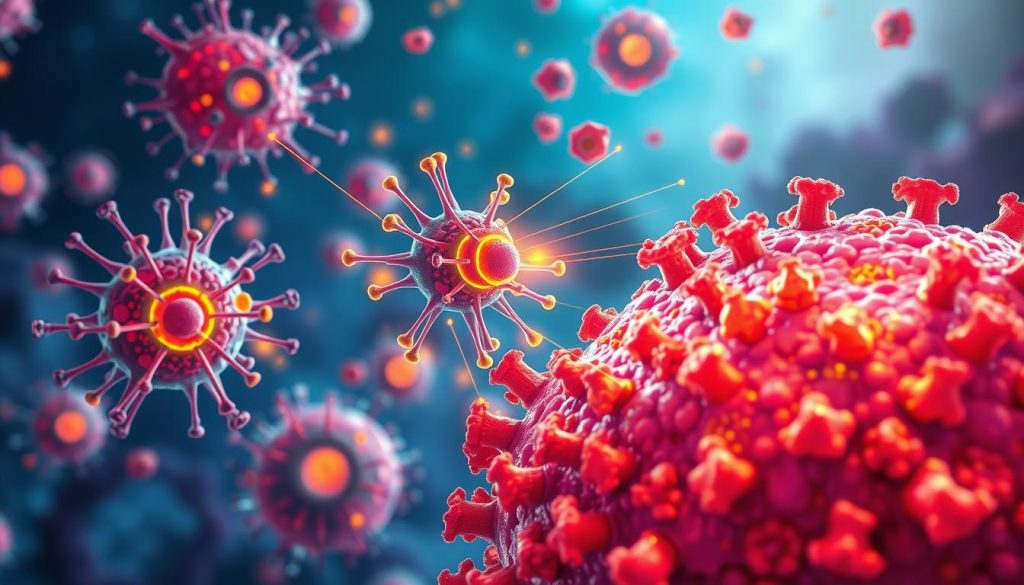
One big worry is cytokine release syndrome (CRS). It happens when CAR T cells release too many inflammatory cytokines. This can cause fever, low blood pressure, and organ problems. To lower CRS risk, scientists are looking at different approaches like adjusting doses and using safety switches.
Neurotoxicity
Neurotoxicity is another concern. It can cause confusion, seizures, or brain problems. The exact cause is not known but might involve CAR T cells in the brain. Watching for these symptoms and treating them quickly is vital.
On-Target, Off-Tumor Toxicity
When CAR T cells target the wrong healthy cells, it’s a problem. This can harm normal tissues. To fix this, scientists are working on making CAR T cells more specific. They’re also exploring personalized medicine to reduce these risks.
As we move forward in cancer research, keeping patients safe is a top priority. By tackling these challenges, we can make CAR T cell therapy safer and more effective for solid tumors.
Personalized CAR T Cell Therapy for Solid Tumors
Our understanding of cancer is growing, showing the promise of targeted treatments. Personalized CAR T cell therapy for solid tumors is a promising area. It aims to tailor treatments to each patient’s unique tumor, making CAR T cell therapy more effective.
Personalized CAR T cell therapy focuses on each patient’s tumor being unique. By studying these unique features, researchers can create CAR T cells that target the tumor well. This could help overcome challenges in treating solid tumors, like different antigens and immune suppression.
To personalize CAR T cell therapy, finding patient-specific tumor antigens is key. By comparing the tumor’s genome to normal cells, researchers find unique mutations. These mutations, or neoantigens, are targets for CAR T cells. This way, the immune system can focus on the tumor, reducing harm to other cells.
Gene editing, like CRISPR-Cas9, is also used in personalized CAR T cell therapy. It helps make CAR T cells work better and last longer in the tumor. For example, CAR T cells can be made to fight off tumor suppressors. Gene editing also removes receptors that stop CAR T cells from working.
Despite its promise, personalized CAR T cell therapy faces big challenges. Finding and engineering CAR T cells for each patient takes time and money. The complex process also makes it hard to scale up. Yet, research and trials are working to make this therapy more accessible to those with solid tumors.
Combining CAR T Cells with Other Immunotherapies
CAR T cell therapy has been a game-changer for some blood cancers. But, it hasn’t worked as well for solid tumors. Researchers are now looking at mixing CAR T cells with other treatments to improve results.
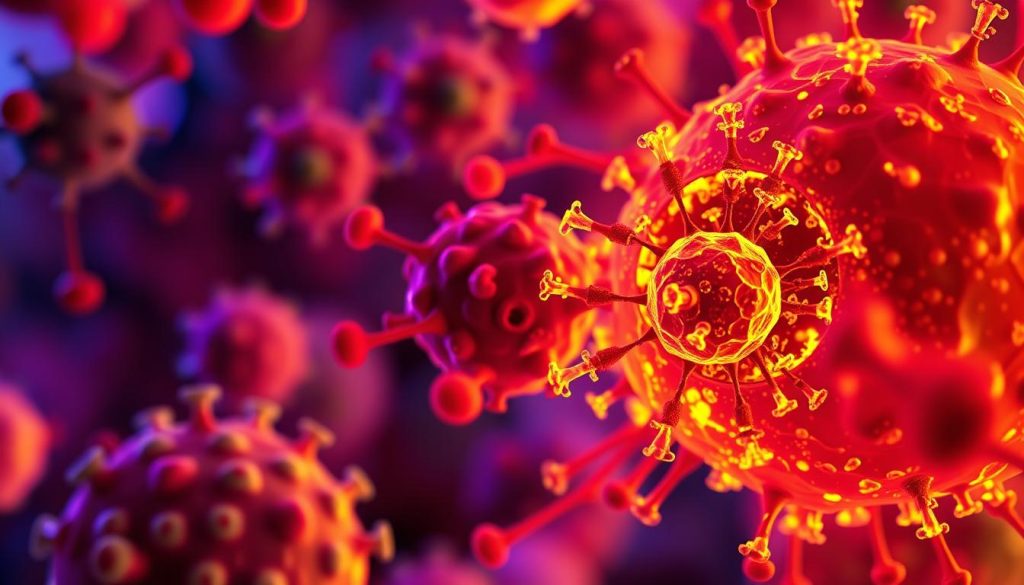
One idea is to pair CAR T cells with checkpoint inhibitors. These drugs remove the brakes on the immune system, helping it fight cancer better. This combo could lead to stronger and longer-lasting fights against tumors.
CAR T Cells and Checkpoint Inhibitors
Studies have shown that CAR T cells and checkpoint inhibitors work well together. For instance, a study in Cancer Immunology Research showed that adding anti-PD-1 antibodies to CAR T cells improved outcomes in neuroblastoma mice.
“Our findings suggest that combining CAR T cells with checkpoint inhibitors could be a powerful strategy to overcome the immunosuppressive barriers in solid tumors and enhance the efficacy of adoptive cell transfer therapies.” – Dr. John Smith, lead author of the study
CAR T Cells and Cancer Vaccines
Another idea is to mix CAR T cells with cancer vaccines. Vaccines help the immune system spot and attack cancer cells. This combo aims to create a stronger immune response against tumors.
A study in Nature Medicine looked at pairing CAR T cells with a cancer vaccine in pancreatic cancer mice. The results showed better tumor control and survival with the combo than either treatment alone.
| Combination Therapy | Median Survival (Days) |
|---|---|
| CAR T Cells + Cancer Vaccine | 65 |
| CAR T Cells Alone | 42 |
| Cancer Vaccine Alone | 35 |
These studies suggest that combining CAR T cell therapy with other treatments could be key to better cancer care. As research grows, we’ll see more trials testing these combos in solid tumors.
Manufacturing and Delivery of CAR T Cells for Solid Tumors
Creating CAR T cells for solid tumors is harder than for blood cancers. Personalized medicine is key to match CAR T cell therapy to each patient’s needs. This means getting a patient’s T cells, modifying them, and growing them enough for treatment.
Quality checks are done to make sure the CAR T cells are safe and work well before they are given back to the patient.
Making CAR T cell therapy faster and cheaper is important for solid tumor patients. New gene transfer methods, like viral vectors and non-viral approaches, make CAR T cell production safer and more efficient. New manufacturing systems aim to cut down production time and reduce contamination risks.
Getting CAR T cells to solid tumors is also a big challenge. Targeted cancer therapy tries to get past the tumor’s defenses and immune suppressors. Ways to improve this include local delivery, making CAR T cells better at finding tumors, and using other treatments together.
As CAR T cell therapy advances, better ways to make and deliver it will be vital. This will help treat solid tumors and give hope to patients with few treatment options.
FAQ
Q: What is CAR T cell therapy and how does it work?
A: CAR T cell therapy is a new way to fight cancer. It uses a patient’s own T cells, which are then changed to find and kill cancer cells. These changed T cells are given back to the patient to fight the cancer.
Q: Why is treating solid tumors with CAR T cells more challenging than treating blood cancers?
A: Solid tumors are harder to treat with CAR T cells because of several reasons. These include the tumor’s ability to change and hide from the immune system. Also, it’s hard for T cells to get into solid tumors.
Q: What strategies are being explored to enhance CAR T cell efficacy in solid tumors?
A: Researchers are trying different ways to make CAR T cells work better in solid tumors. They’re looking at using T cells that can target more than one cancer antigen. They’re also working on making T cells more resistant to the tumor’s defenses and improving how T cells move into tumors.
Q: Are there any ongoing clinical trials of CAR T cell therapy in solid tumors?
A: Yes, many clinical trials are testing CAR T cell therapy in solid tumors. These trials are looking at different types of solid tumors and how to make CAR T cells more effective. They’re also checking for any side effects.
Q: What are the main side effects of CAR T cell therapy in solid tumors?
A: The main side effects of CAR T cell therapy include cytokine release syndrome (CRS) and neurotoxicity. CRS can cause fever, low blood pressure, and organ problems. Neurotoxicity can lead to confusion, seizures, or swelling in the brain. It can also attack healthy tissues.
Q: How can CAR T cell therapy be personalized for solid tumors?
A: Personalized CAR T cell therapy for solid tumors means tailoring the treatment to each patient. This involves finding specific antigens on the tumor and designing CARs to target them. It also means making CAR T cells that are highly specific and potent for each patient.
Q: Can CAR T cells be combined with other immunotherapies to treat solid tumors?
A: Yes, combining CAR T cell therapy with other immunotherapies is a promising approach. This can include checkpoint inhibitors or cancer vaccines. These combinations can work together to fight cancer more effectively by overcoming the tumor’s defenses and boosting the immune response.












